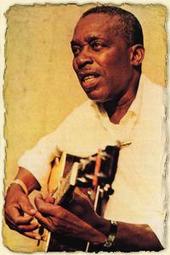Myspace Layouts at Pimp-My-Profile.com / Acoustic Guitar
Nehemiah Curtis "Skip" James (June 21, 1902 October 3, 1969) was an American blues singer, guitarist, pianist and songwriter. James was born near Bentonia, Mississippi. As a youth, he heard local musicians such as Henry Stuckey and brothers Charlie and Jesse Sims and began playing the organ in his teens. He worked on road construction and levee-building crews in his native Mississippi in the early 1920s, and wrote what is perhaps his earliest song, "Illinois Blues", about his experiences as a laborer. Later in the '20s he sharecropped and made bootleg whiskey in the Bentonia area. He began playing guitar in open E-minor tuning and developed a three-finger picking technique that he would use to great effect on his recordings. In addition, he began to practice piano-playing, drawing inspiration from the Mississippi blues pianist Little Brother Montgomery.In early 1931 James auditioned for the Jackson, Mississippi record shop owner and talent scout H. C. Speir, who placed blues performers with a variety of record labels including Paramount Records. On the strength of this audition, Skip James traveled to Grafton, Wisconsin to record for Paramount. James's 1931 work is considered uniquely idiosyncratic among pre-war blues recordings, and forms the basis of his reputation as a musician.As is typical of his era, James recorded a variety of material -- blues and spirituals, covers and original compositions -- frequently blurring the lines between genres and sources. For example, "I'm So Glad" was derived from a 1927 song by Art Sizemore and George A. Little entitled "So Tired", which had been recorded in 1928 by both Gene Austin and Lonnie Johnson (the latter under the title "I'm So Tired of Livin' All Alone"). James changed the song's lyrics, transforming it with his virtuoso technique, moaning delivery, and keen sense of tone. Biographer Stephen Calt, echoing the opinion of several critics, considered the finished product totally original, "one of the most extraordinary examples of fingerpicking found in guitar music."Several of the Grafton recordings, such as "Hard Time Killing Floor Blues", "Devil Got My Woman", "Jesus Is A Mighty Good Leader", and "22-20 Blues" (the basis for Robert Johnson's better-known "32-20 Blues"), have proven similarly influential. Very few original copies of James's Paramount 78s have survived.
For the next thirty years, James recorded nothing and drifted in and out of music. He was virtually unknown to listeners until about 1960. In 1964 blues enthusiasts John Fahey, Bill Barth and Henry Vestine found him in a Tunica, Mississippi hospital. According to Calt, the "rediscovery" of both Skip James and of Son House at virtually the same moment was the start of the "blues revival" in America. In July 1964 James, along with other rediscvoered performers, appeared at the Newport Folk Festival. Several photographs by Dick Waterman captured this first performance in over 30 years. Throughout the remainder of the decade, he recorded for the Takoma, Melodeon, and Vanguard labels and played various engagements until his death in 1969.Although not initially covered as frequently as other rediscovered musicians, British rock band Cream recorded two versions of "I'm So Glad" (a studio version and a live version), providing James the only windfall of his career. Despite the band's well-known musicianship, Cream based their version on James's simplifed 60s recording, instead of the faster, more intricate 1931 original.Since his death, James's music has become more available and prevelent than during his lifetime -- his 1931 recordings, along with several rediscovery recordings and concerts, have found their way on numerous compact discs, drifting in and out of print. His influence is still felt among contemporary bluesmen, as well as more mainstream performers such as Beck, who sings a partially-secularized, Skip-inspired version of "Jesus Is A Mighty Good Leader" on his 1994 "anti-folk" record, One Foot in the Grave. James has left his mark on 21st-century Hollywood, as well, with a cover of "Hard Time Killing Floor Blues" appearing in O Brother, Where Art Thou? and the 1931 "Devil Got My Woman Blues" being featured prominantly in the plot and soundtrack of Ghost World.
